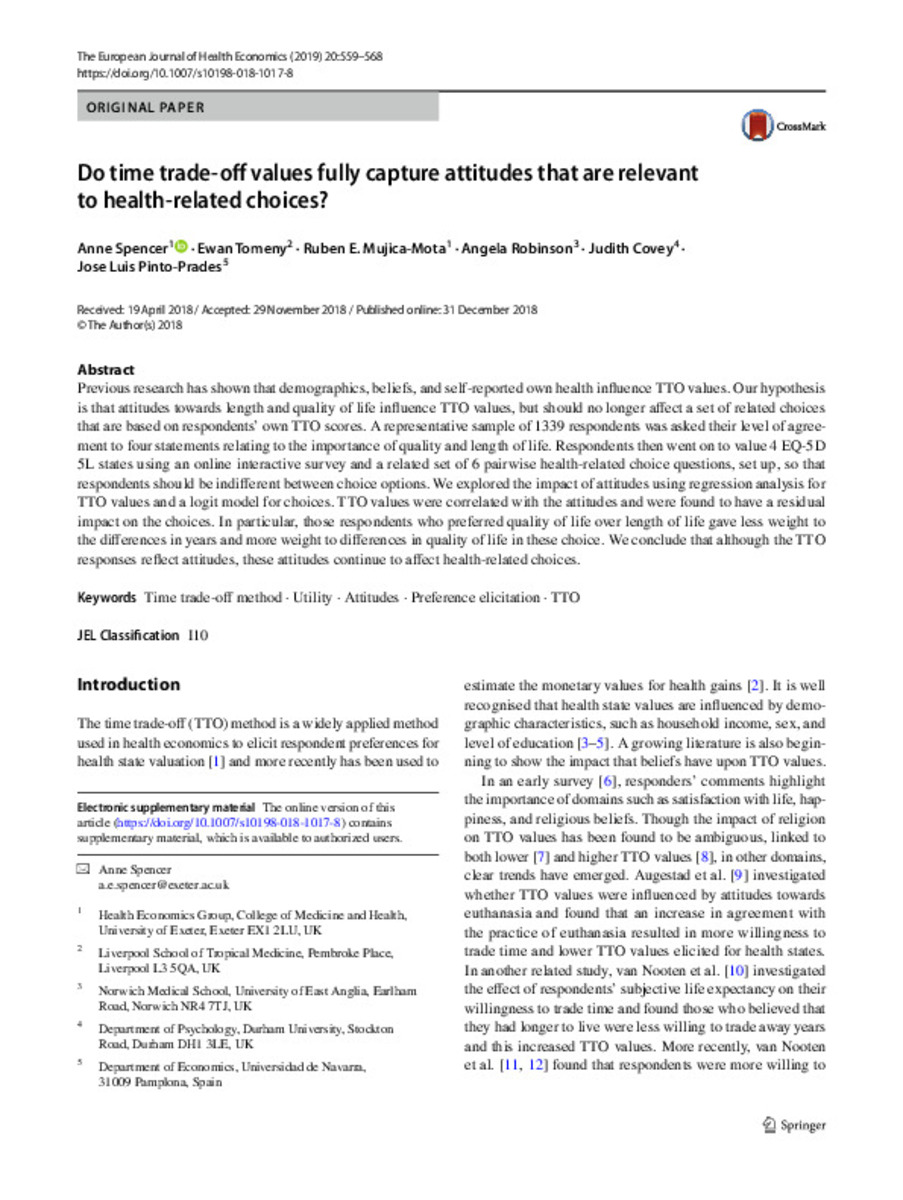Registro completo de metadatos
| Campo DC | Valor | Lengua/Idioma |
|---|---|---|
| dc.creator | Spencer, A. (Anne) | - |
| dc.creator | Tomeny, E. (Ewan) | - |
| dc.creator | Mujica‑Mota, R.E. (Ruben E.) | - |
| dc.creator | Robinson, A. (Angela) | - |
| dc.creator | Covey, J. (Judith) | - |
| dc.creator | Pinto‑Prades, J.L. (José Luis) | - |
| dc.date.accessioned | 2022-02-08T12:22:55Z | - |
| dc.date.available | 2022-02-08T12:22:55Z | - |
| dc.date.issued | 2019 | - |
| dc.identifier.citation | Spencer, A. (Anne); Tomeny, E. (Ewan); Mujica‑Mota, R.E. (Ruben E.); et al. "Do time trade-off values fully capture attitudes that are relevant to health-related choices?". The European Journal of Health Economics. 20 (2019), 2019, 559 - 568 | es_ES |
| dc.identifier.issn | 1618-7598 | - |
| dc.identifier.uri | https://hdl.handle.net/10171/62892 | - |
| dc.description.abstract | Previous research has shown that demographics, beliefs, and self-reported own health influence TTO values. Our hypothesis is that attitudes towards length and quality of life influence TTO values, but should no longer affect a set of related choices that are based on respondents’ own TTO scores. A representative sample of 1339 respondents was asked their level of agreement to four statements relating to the importance of quality and length of life. Respondents then went on to value 4 EQ-5D 5L states using an online interactive survey and a related set of 6 pairwise health-related choice questions, set up, so that respondents should be indifferent between choice options. We explored the impact of attitudes using regression analysis for TTO values and a logit model for choices. TTO values were correlated with the attitudes and were found to have a residual impact on the choices. In particular, those respondents who preferred quality of life over length of life gave less weight to the differences in years and more weight to differences in quality of life in these choice. We conclude that although the TTO responses reflect attitudes, these attitudes continue to affect health-related choices. | es_ES |
| dc.description.sponsorship | Financial support for this study was provided by a grant to Jose Luis Pinto Prades from the Spanish Ministry of Education, Research grant ECO2010.22041.C02.01 and Junta de Andalucía, Project P09.SEJ.4992. | es_ES |
| dc.language.iso | eng | es_ES |
| dc.publisher | Springer Science and Business Media LLC | es_ES |
| dc.rights | info:eu-repo/semantics/openAccess | es_ES |
| dc.subject | Time trade-off method | es_ES |
| dc.subject | Utility | es_ES |
| dc.subject | Attitudes | es_ES |
| dc.subject | Preference elicitation | es_ES |
| dc.subject | TTO | es_ES |
| dc.title | Do time trade-off values fully capture attitudes that are relevant to health-related choices? | es_ES |
| dc.type | info:eu-repo/semantics/article | es_ES |
| dc.description.note | This article is distributed under the terms of the Creative Commons Attribution 4.0 International License (http://creativecommons.org/licenses/by/4.0/) | es_ES |
| dc.identifier.doi | 10.1007/s10198-018-1017-8 | - |
| dadun.citation.endingPage | 568 | es_ES |
| dadun.citation.number | 2019 | es_ES |
| dadun.citation.publicationName | The European Journal of Health Economics | es_ES |
| dadun.citation.startingPage | 559 | es_ES |
| dadun.citation.volume | 20 | es_ES |
Ficheros en este ítem:
Estadísticas e impacto
Los ítems de Dadun están protegidos por copyright, con todos los derechos reservados, a menos que se indique lo contrario.






